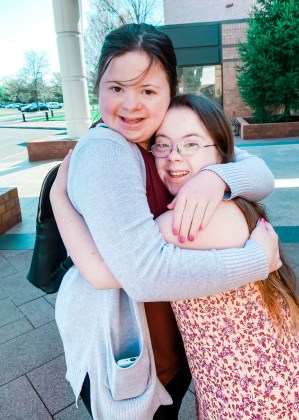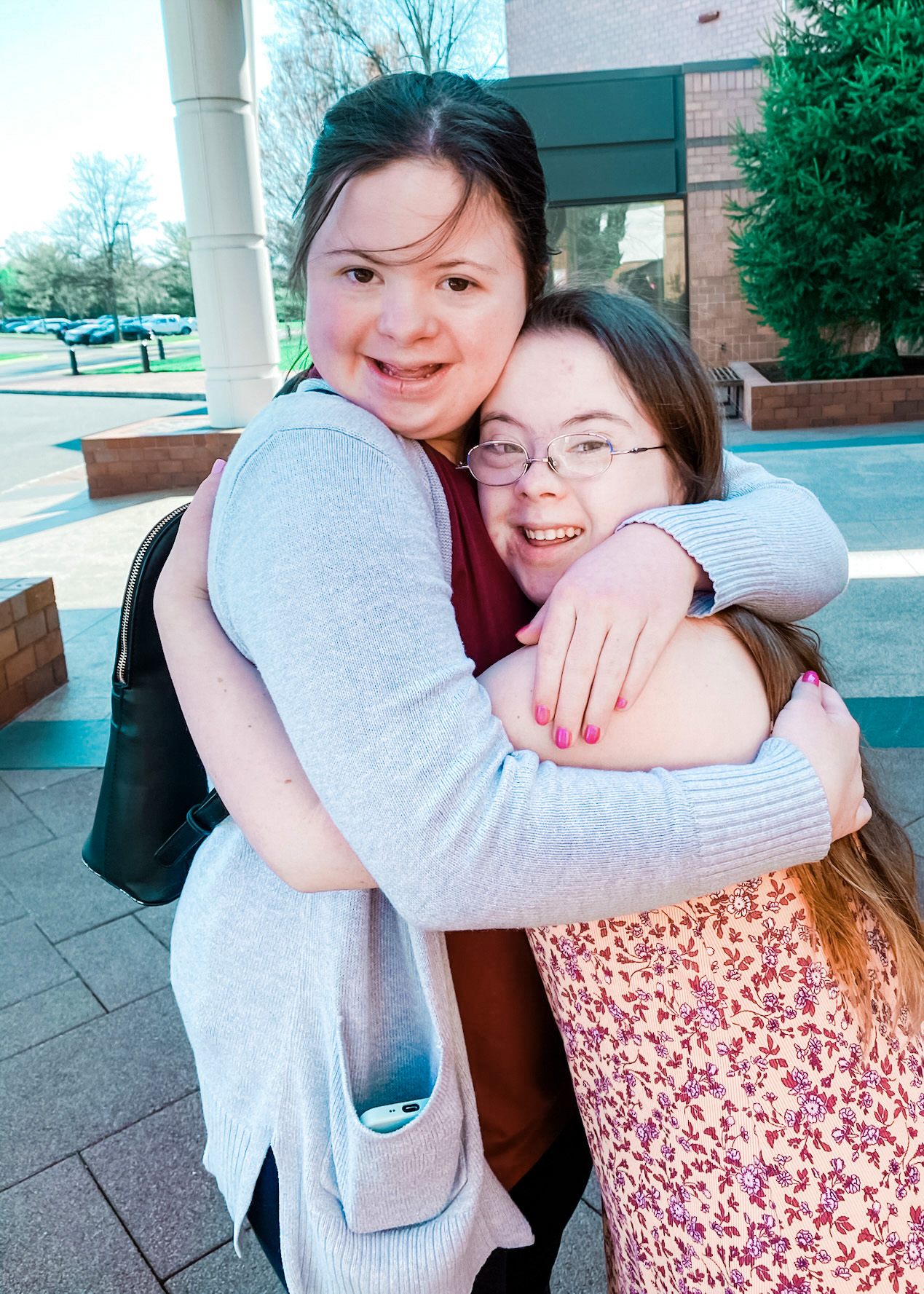Every Sunday afternoon, my daughter and I join a Zoom call with her friend and her friend’s mom, who live a few hours away—for a special time we’ve come to call “God Talk.”
My 17-year-old daughter, Penny, and her 18-year-old friend, Rachel, both have Down syndrome. A while back, Rachel noticed us praying before meals and asked if she could join us. This led to a few conversations about what it looks like to follow Jesus. And eventually, as Rachel’s mother, Ginny, told me a few weeks later, every night Rachel extended her hands and said, “Thank you, God, for having us.”
That’s when the four of us decided to start reading The Jesus Storybook Bible together over Zoom. In our first chat ever, I asked the girls how God sees us—and without hesitation, Rachel said, “God just loves us to pieces.” The truth of God’s love and welcome seemed to sink into her being, as if we had simply given words to something she had subconsciously known all along.
I’m a 46-year-old woman with a master of divinity and credentials as a pastor—and I learn something new every week from reading and praying with Penny and Rachel. They have taught me a more expansive way to encounter God through the Bible.
I think about the time Penny hid her face when we moved from the story of the Crucifixion to the Resurrection because, in her words, she didn’t want to give away “the best part.” Or when we were reading about Jesus asleep in the boat during the storm, Rachel linked the chaos of the sea’s raging waters with Pharaoh in Egypt and the snake in the garden.
At the time, I happened to be listening to a podcast with Tim Mackie, from the BibleProject, who underscored Rachel’s spiritual insight in seeing the snake, Pharoah, and the sea as symbols of chaos.
Mackie mentioned that most westerners do not have highly developed symbolic imaginations. Having grown up and trained in an analytical exegetical framework, I’m familiar with the Bible’s historical context and its hermeneutical and theological truths. Rationalistic thinking both helps and hinders our reading of Scripture. But this approach can miss some of the more intuitive ways to approach Scripture and keep me from making these kinds of connections.
I’m grateful to Penny and Rachel for growing my ability to understand the emotional and symbolic power behind the words on the page.
In the early days of Penny’s life, I remember a friend saying to me, “I can’t wait to see the ministry that Penny will have.” It had not occurred to me that Penny would have a ministry of her own. His words helped me look for her gifts and not just her needs as she grew up.
But “God Talk” with Penny and Rachel has helped me recognize that their spiritual lives in and of themselves are a gift. While I can identify ways and places where these two young women might minister to others, I can also simply receive grace, truth, and wisdom from who they are.
My experience with Penny and Rachel made me wonder about the spiritual lives of other people with intellectual or developmental disabilities. So, I set out to interview several others with Down syndrome, autism, and similar conditions.
 Courtesy of Amy Julia Becker
Courtesy of Amy Julia BeckerI had a brief conversation over the phone with Marcy Lesesne, a 54-year-old woman who lives in Durham, North Carolina. Marcy has ataxia—which, in her case, includes intellectual disability. I had heard that Marcy loves to pray and read the Bible, and I wanted to ask her about it. While I did not receive a coherent story or a portrait of her spiritual experience, Marcy told me pieces of her life: that she had an accident and uses a walker, that she needs to wait on the Lord, that she has not experienced answers to prayer, that she feels anxious, and that she wants healing.
I also met by Zoom with Josh Catlin, a 42-year-old man with a dual diagnosis of Down syndrome and autism. He told me that he feels good when he reads the Bible, and as we talked, Josh read to me from Isaiah and Psalms and the Gospel of Matthew.
That was about the extent of Josh’s description of his own spiritual life, and then his family members helped fill out the rest of the picture. According to his dad, Pete, the only book Josh reads is the Bible, and he reads it daily with devotion and passion. He described walking into Josh’s room and finding him with his hands raised in a posture of worship.
At the end of our call, his brother Scott said, “Josh is the most spiritual person. Not in a pat-the-special-person-on-the-head way.” Scott asked me if I knew the passage from Proverbs 3:5–6 about the one who trusts in the Lord with everything. He continued, “Josh is the personification of that. His paths are straight.”
I began to recognize how tricky it is for me to articulate something true about the spiritual lives of people with intellectual disabilities—and to capture these truths in their own words. Many express themselves with minimal, if any, spoken words. And even among those who could verbally communicate, asking them to reflect and put into words their lived experience over Zoom was nearly impossible. Online interviews were not going to offer me quotable sentences or concise explanations.
I called John Swinton, author of Becoming Friends of Time and theology professor at the University of Aberdeen, who helped me consider the root of this problem. He explained that the difficulty with trying to collect stories like these is that we run the risk of imposing or projecting meaning on the experiences of others. And yet we also run the risk of negating or ignoring those experiences if we do not try to convey them at all.
Swinton suggested that the best way to learn about the spiritual lives of others—especially when they cannot use words to convey their experiences—is to form what he calls “narrative communities.” We may impose or project meaning incorrectly, but we can bear witness together to the life of the Spirit among us when we tell the story of God’s activity in community.
Swinton and other leaders in disability theology also point out that spoken language is not the only way we can communicate our spiritual lives. Paul even writes that the Spirit of God groans without words on our behalf (Rom. 8:26). In what ways might we receive the wordless groans of our fellow humans as an expression of a deep knowledge of God’s Spirit?
I realized that I cannot convey very much about the spiritual lives of Marcy and Josh at least in part because I do not live in community with them. The truth I can offer comes not only from them but also from the people around them who can speak to their lived experience together.
Most of us live in spaces (and worship in churches) sequestered from people with intellectual disabilities. Even within churches who intentionally include people with IDD, they are often placed in special programs rather than welcomed as full participants within the church.
In other words, most of us do not form narrative communities that receive and reflect the gifts and capacities offered by people who are neurodivergent or nonverbal. The problem is not with the limitations of verbal or intellectual expression but with the restriction of our relationships.
I receive the gift of being in community with Penny and Rachel as well as other people with intellectual disabilities who are members of our own local church. Knowing them, as well as watching them grow spiritually, has expanded my awareness of God’s tender care and loving-kindness.
They have offered me simple expressions of faith. They have challenged me to live in love. And they have helped me see that I cannot write about the gift of their spiritual lives unless I know them intimately—a knowledge far deeper than a 30-minute phone or Zoom call can afford.
These types of relationships will happen only as local churches seek out families and individuals affected by disability and “compel them to come in” (Luke 14:23)—with a posture of receptivity and trust that they are equal and crucial members of the body of Christ.
In her sermon on 1 Corinthians 12—the passage where Paul says God has bestowed more honor to the parts of the body that we see as weaker—disability theologian Jill Harshaw speaks to our need to recognize the significance of all members of the body of Christ: “What if we’ve excluded ourselves from a kingdom way of doing church? What if we need [people with disabilities] to include us?”
Jesus anticipates Harshaw’s questions when he is invited to dinner at the home of a “prominent Pharisee” (Luke 14) for what is supposed to be a celebratory meal. As soon as Jesus is seated—among a group of other religious men—he begins to critique everyone present. He tells the other guests that they chose the wrong seats, and he tells the host that he invited the wrong people.
Jesus exhorts the host to invite “the poor, the crippled, the lame, the blind.” He goes on to portray the kingdom of God as a meal in which those who are most likely to be excluded from our religious communities are instead offered an intentional invitation to take a seat at the center of those communities.
The religious elite in Jesus’ day failed to recognize the importance of sharing a Sabbath meal with those who were on the margins of their social groups. Likewise, many believers today fail to recognize the beauty, love, and witness of people with intellectual disabilities in their local churches.
We need these very people at our table. With them and through them, we can all better grasp the expansive welcome of God’s love.
Amy Julia Becker is the author of four books, including her most recent, To Be Made Well: An Invitation to Wholeness, Healing, and Hope.












